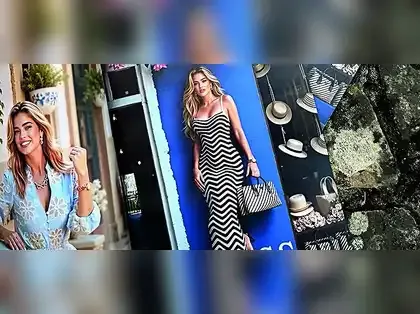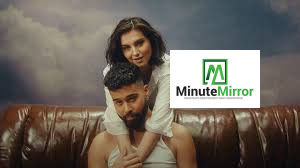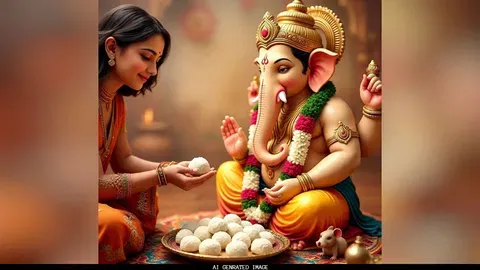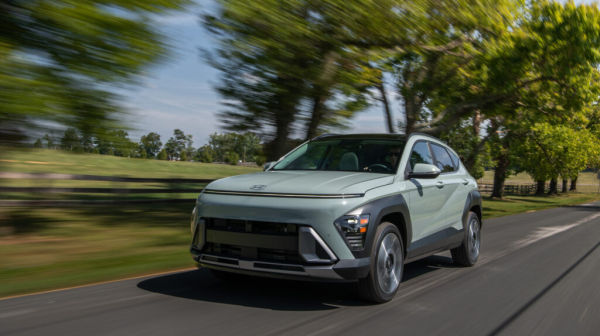Earlier this month, the fashion industry was set all abuzz by a 2-page advert of California clothing company Guess. It featured a 'picture-perfect' blonde model flaunting a striped maxi dress and floral playsuit in Vogue's August print issue, sandwiched between Anne Hathaway's cover appearance and editorials discussing female leadership in fashion and women's representation in sports.
The model appears 'perfect', the much pop cultural-media-manufactured notion of the 'ideal blonde' made 'flesh'. There's one small detail, though. As the advertisement discloses in small text in one corner, the lady's image - indeed, the lady herself - was 'produced by Seraphinne Vallora on AI,' Seraphinne Vallora being an AI marketing agency for fashion and luxury brands.
An AI-generated model in the pages of the fashion bible has already created a storm on social media. Despite being an advert - not a Vogue editorial - it has sparked a seismic reaction. Using an AI model with the same visual impact as using a real one can save thousands of dollars in fees, starting with that of any modelling agency.
But it's much more than cost-cutting. Fashion has always been about history, identity, rebellion, and storytelling - never just been about a 'nice photoshoot'. AI-generated models could uphold 'unachievable' beauty standards - till now the domain of airbrushing and other post-shoot processes - and could even endanger diversity in fashion. And what about the future of real models?
The concerns are similar to those expressed in 'Joan is Awful' from the streaming series Black Mirror. In the episode, Hollywood actor Salma Hayek playing herself struggles with the realisation that a production company may use her AI likeness without her consent. Then there was tech entrepreneur and former model Sinead Bovell's 2020 essay for Vogue, 'I Am a Model and I Know That Artificial Intelligence Will Eventually Take My Job.' We may be there already.
So, what are the wider ramifications of the Guess ad? AI is permeating human lives in today's world, for sure, endangering jobs and eroding human creativity. The severity is so great that we have already witnessed real-life human uprisings against AI by Writers Guild of America (WGA) and Screen Actors Guild-American Federation of Television and Radio Artists (SAG-AFTRA). Such fights, however, are likely to continue as a contemporary version of the Luddite movement until the struggle is ultimately lost.
The human-AI relationship is exploring new frontiers. A 36-yr-old New Yorker, Rosanna Ramos, talked about her unconventional marriage to an AI robot in 2023. Consequently, human-AI relationships portrayed in films such as Her, Blade Runner, and Ex Machina seem more and more plausible. No wonder that in her July 2025 Vogue essay, 'Artificial Intelligence Is Changing the Way We Navigate Romantic Relationships,' journalist Brianna Holt asks, 'What happens to love, intimacy, and emotional growth when our most vulnerable moments are processed with machines?'
The issue of 'automated-authentic' balance is delicate. The human touch and emotional intelligence cannot be replaced - at least, not as of now. But is it then going to be de rigueur to utilise AI as an aid, a supplement, and not as a replacement?
In 1997, Garry Kasparov lost to IBM's 'Deep Blue' supercomputer, marking a defining moment in human history. But the grandmaster quickly learned from his chess defeat. In his 2018 book, Deep Thinking: Where Machine Intelligence Ends and Human Creativity Begins, Kasparov argues that a better way to counter AI is to embrace its potential to broaden human horizons.
The cover of Vogue's first issue in December 1892 showed a debutante emerge from an ethereal - and, one imagines, fragrant - cloud of roses and butterflies. The world has changed remarkably since then. Today, AI is all set to take control of every bit of our lifestyles. And Vogue's AI-generated ad could be simply keeping up with the times.
Roger Lynch, CEO of Conde Nast, publisher of Vogue, stated that it was 'crucial' for the company to 'meet audiences where they are and embrace new technologies'. This is pretty much what Kasparov, too, had suggested in his way. The question now remains whether AI models and renditions will become the standard go to - not just for Vogue, but for publicity material in general that intends to be in vogue across platforms. Watch this spAIce.
The writer is professor of statistics, Indian Statistical Institute , Kolkata
The model appears 'perfect', the much pop cultural-media-manufactured notion of the 'ideal blonde' made 'flesh'. There's one small detail, though. As the advertisement discloses in small text in one corner, the lady's image - indeed, the lady herself - was 'produced by Seraphinne Vallora on AI,' Seraphinne Vallora being an AI marketing agency for fashion and luxury brands.
An AI-generated model in the pages of the fashion bible has already created a storm on social media. Despite being an advert - not a Vogue editorial - it has sparked a seismic reaction. Using an AI model with the same visual impact as using a real one can save thousands of dollars in fees, starting with that of any modelling agency.
But it's much more than cost-cutting. Fashion has always been about history, identity, rebellion, and storytelling - never just been about a 'nice photoshoot'. AI-generated models could uphold 'unachievable' beauty standards - till now the domain of airbrushing and other post-shoot processes - and could even endanger diversity in fashion. And what about the future of real models?
The concerns are similar to those expressed in 'Joan is Awful' from the streaming series Black Mirror. In the episode, Hollywood actor Salma Hayek playing herself struggles with the realisation that a production company may use her AI likeness without her consent. Then there was tech entrepreneur and former model Sinead Bovell's 2020 essay for Vogue, 'I Am a Model and I Know That Artificial Intelligence Will Eventually Take My Job.' We may be there already.
So, what are the wider ramifications of the Guess ad? AI is permeating human lives in today's world, for sure, endangering jobs and eroding human creativity. The severity is so great that we have already witnessed real-life human uprisings against AI by Writers Guild of America (WGA) and Screen Actors Guild-American Federation of Television and Radio Artists (SAG-AFTRA). Such fights, however, are likely to continue as a contemporary version of the Luddite movement until the struggle is ultimately lost.
The human-AI relationship is exploring new frontiers. A 36-yr-old New Yorker, Rosanna Ramos, talked about her unconventional marriage to an AI robot in 2023. Consequently, human-AI relationships portrayed in films such as Her, Blade Runner, and Ex Machina seem more and more plausible. No wonder that in her July 2025 Vogue essay, 'Artificial Intelligence Is Changing the Way We Navigate Romantic Relationships,' journalist Brianna Holt asks, 'What happens to love, intimacy, and emotional growth when our most vulnerable moments are processed with machines?'
The issue of 'automated-authentic' balance is delicate. The human touch and emotional intelligence cannot be replaced - at least, not as of now. But is it then going to be de rigueur to utilise AI as an aid, a supplement, and not as a replacement?
In 1997, Garry Kasparov lost to IBM's 'Deep Blue' supercomputer, marking a defining moment in human history. But the grandmaster quickly learned from his chess defeat. In his 2018 book, Deep Thinking: Where Machine Intelligence Ends and Human Creativity Begins, Kasparov argues that a better way to counter AI is to embrace its potential to broaden human horizons.
The cover of Vogue's first issue in December 1892 showed a debutante emerge from an ethereal - and, one imagines, fragrant - cloud of roses and butterflies. The world has changed remarkably since then. Today, AI is all set to take control of every bit of our lifestyles. And Vogue's AI-generated ad could be simply keeping up with the times.
Roger Lynch, CEO of Conde Nast, publisher of Vogue, stated that it was 'crucial' for the company to 'meet audiences where they are and embrace new technologies'. This is pretty much what Kasparov, too, had suggested in his way. The question now remains whether AI models and renditions will become the standard go to - not just for Vogue, but for publicity material in general that intends to be in vogue across platforms. Watch this spAIce.
The writer is professor of statistics, Indian Statistical Institute , Kolkata
(Disclaimer: The opinions expressed in this column are that of the writer. The facts and opinions expressed here do not reflect the views of www.economictimes.com.)






Atanu Biswas
Professor, Indian Statistical Institute, Kolkata